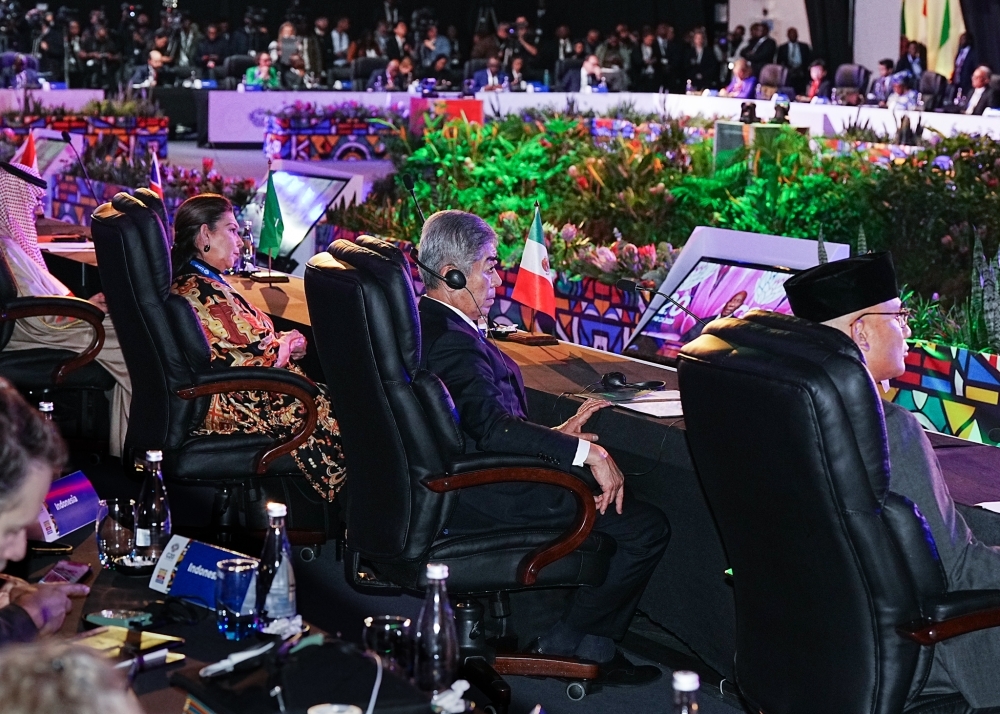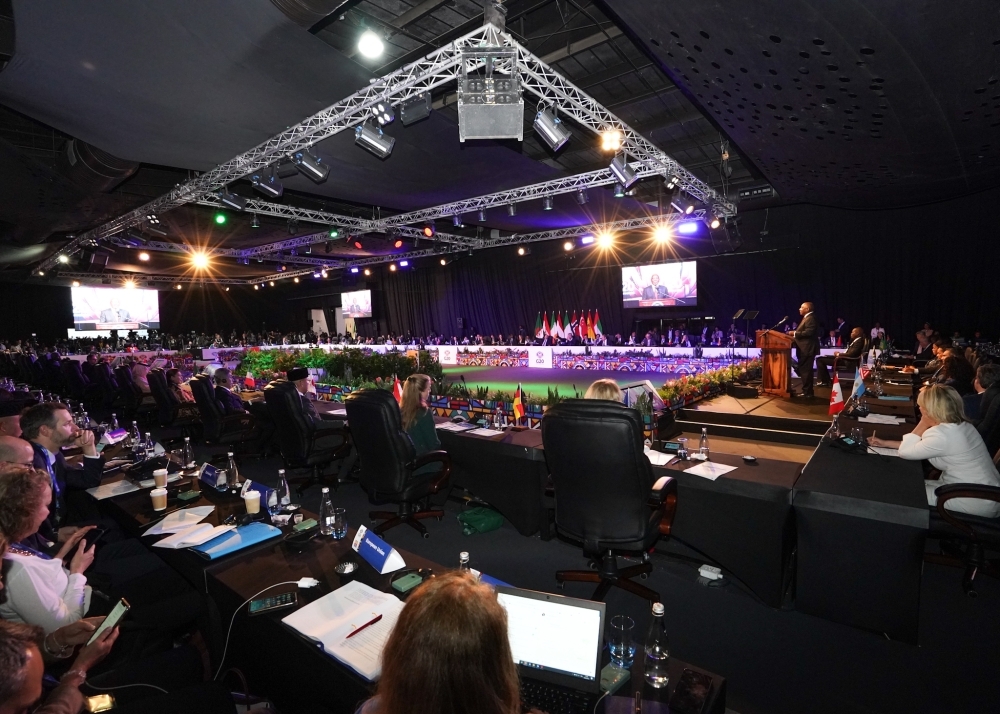G20 (Summit on Financial Markets and the World Economy)
G20 Foreign Ministers’ Meeting
(Summary)


On February 20th and 21st, the G20 Foreign Ministers’ Meeting was held in Johannesburg, South Africa. Mr. IWAYA Takeshi, Minister for Foreign Affairs of Japan, attended it. The overview of the meeting is as follows. At the meeting, participants discussed the regional affairs including the situations in Ukraine and the Middle East, as well as the initiatives for the G20 summit in this November. The Presidency, South Africa, under the theme of “Solidarity, Equality and Sustainability,” proposed four priority areas: (1) Strengthening disaster resilience and response; (2) Ensuring debt sustainability for low-income countries; (3) Mobilizing finance for a Just Energy Transition; and (4) Harnessing critical minerals for inclusive growth and sustainable development. It gained support from each member.
1 Session 1 “Opening”
In this session, which started at 2:30 p.m. on February 20th, local time (9:30 p.m., JST) and lasted for approximately 30 minutes, H.E. Mr. Matamela Cyril Ramaphosa, President of the Republic of South Africa and Hon. Mr. Ronald Lamola, Minister of International Relations and Cooperation of the Republic of South Africa gave opening speeches.
2 Session 2 “Global Geopolitical Situation”
In this session, which was held from 3:40 p.m. on February 20th, local time (10:40 p.m., JST), for approximately 4 hours and 20 minutes, participants discussed regional affairs, including the situations in Ukraine and the Middle East.
- At the outset, Foreign Minister Iwaya made the following remarks.
(i) Beginning with Russia's aggression against Ukraine, the international community faces major challenges to the rule of law, and it is necessary to firmly restore an international order based on the rule of law and to ensure peace and stability in the international community.
(ii) Unilateral attempts to change the status quo by force should never be tolerated anywhere in the world, including in the East China Sea and the South China Sea.
(iii) Based on these perspectives, Japan will continue to promote concrete coordination and cooperation with its partners towards realizing a “Free and Open Indo-Pacific.” - Foreign Minister Iwaya made the following remarks on the situation in Ukraine, and other issues.
(i) Regarding Russia’s aggression against Ukraine, various diplomatic efforts are currently ongoing to achieve peace, and we hope that these efforts will lead to an end to the prolonged combat and help achieve a breakthrough in this difficult situation.
(ii) To achieve peace, Japan will continue to support Ukraine, while cooperating with like-minded countries, and contribute to Ukraine’s mid- to long-term recovery and reconstruction support.
(iii) The security of Europe and Asia is inseparable. Japan expresses serious concern over the Russia-North Korea cooperation, and strongly condemns the engagement of North Korean troops in combat. A robust response by the international community, including the full implementation of UN Security Council resolutions, is essential.
(iv) Japan asks for understanding and cooperation from the G20 and other countries for the immediate resolution of the abductions issue. - Foreign Minister Iwaya made the following remarks on the situation in the Middle East.
(i) Implementing the ceasefire agreement steadily and in good faith in Gaza is important. The “day after” in Gaza is directly linked to mid- to long-term peace and stability in the Middle East. The International community has to back and stand behind it. Japan will continue to support a two-state solution. Japan will provide urgent humanitarian assistance, and play an active role in mid- to long-term recovery and reconstruction support.
(ii) Regarding Syria, it is imperative to improve the humanitarian situation that has deteriorated over many years, to prevent further refugees and displaced persons. In addition, the future of Syria should be determined by the Syrian people, and it is important to ensure a peaceful, stable, and inclusive transition to prevent ISIL from expanding its influence again. - Foreign Minister Iwaya made the following remarks on the situation in Africa.
Peace and stability in Africa are also extremely important. Regarding the situations in Sudan and the eastern Democratic Republic of the Congo, Japan is deeply concerned about the deteriorating humanitarian conditions in both countries and neighboring countries, particularly on the ground. The international community needs to act in unity to urge the parties involved to negotiate for a ceasefire and sustainable peace. - Lastly, Foreign Minister Iwaya pointed out that the G20 needs to take the lead in international cooperation, so as to lead the world to cooperation rather than division. Foreign Minister Iwaya also expressed Japan’s intention to seek common ground through dialogue, and advance concrete coordination and cooperation that transcends different positions and confrontation and in which all countries share responsibility.
3 Session 3 “G20 objectives in 2025”
In this session, which was held from 9:30 a.m. on February 21st, local time (4:30 p.m., JST), for approximately 4 hours and 10 minutes, participants discussed global challenges facing the international community, as well as the outcomes of the G20 under South Africa’s Presidency.
- At the outset, Foreign Minister Iwaya made the following remarks.
The international community faces various global challenges, such as climate change, disasters, and food security. In such a situation, the G20 needs to identify common ground and points of agreement, rather than division and confrontation, and lead in solving these issues in a way that all members share responsibility. - Foreign Minister Iwaya made the following remarks on priority issues set forth by South Africa and matters to which Japan attaches importance.
(i) Japan supports the priority issues set forth by South Africa. In particular, Japan attaches importance to strengthening disaster risk reduction and response, utilization of critical minerals, and debt issues, and intends to promote related efforts in cooperation with G20 members.
(ii) As one of the world’s most disaster-affected countries, Japan aims to become the leading nation for disaster risk reduction in the world. While contributing to advancing the implementation of the Sendai Framework for DRR, Japan will share its knowledge and technologies with the international community, including the G20, and contribute to strengthening preparations for and responses to the frequent large-scale natural disasters worldwide, such as earthquakes and typhoons.
(iii) Stable supply of critical minerals through diversification of supply chains is extremely important for a smooth transition to clean energy. Japan promotes efforts to ensure a level playing field in the trade of critical minerals. Furthermore, Japan supports mining development including the launch of resource projects that contribute to building responsible critical mineral supply chains as well as human resource development and technical cooperation in resource-rich countries to aim at local value addition, including through Partnership for Resilient and Inclusive Supply chain Enhancement (RISE)
(iv) There is an urgent need to address the debt issues faced by developing countries. To this end, it is important to speed up the debt restructuring process under the G20 Common Framework and further improve debt transparency.
(v) Regarding AI, Japan intends to facilitate innovation, maximize opportunities, promote human-centric AI and achieve safe, secure, and trustworthy AI. It is essential to close the digital divide so that the benefits of AI can be widely enjoyed in developing countries. Japan will continue to support efforts toward the establishment and enhancement of AI governance in developing countries, including Africa.
(vi) A free and fair economic order is the foundation for global economic growth and prosperity. Japan would like to discuss the WTO reform, which is an urgent issue, at the G20 as well, using this year's 30th anniversary of the WTO's establishment as momentum. - Foreign Minister Iwaya made the following remarks on strengthening cooperation with Africa.
(i) Cooperation with Africa is becoming increasingly important in the G20, in light of the African Union’s (AU’s) accession to the G20 in 2023, and the G20 being held in Africa for the first time this year.
(ii) Africa is a young continent that is full of potential and hope. Japan has long promoted cooperation based on the spirit of African ownership and international partnership.
(iii) In August this year, the summit-level Ninth Tokyo International Conference on African Development (TICAD 9) will be held, and Japan will work to co-create solutions to various challenges with African countries. Japan intends to link the outcomes of TICAD 9 to G20 efforts. - Foreign Minister Iwaya made the following remarks on evaluating the G20 and other matters.
As the importance of the G20 has increased, the scope of the areas that it deals with has also been expanding. Japan agrees with conducting a review of the G20’s original role, outcomes, and challenges to date. Above all, the G20 must make itself a forum that leads the resolution of issues in the international community through even more effective, efficient, and concrete actions. Japan intends to engage in thorough discussions among members. - Lastly, Foreign Minister Iwaya expressed his gratitude for the hospitality of the Presidency, South Africa, and stated that Japan will actively contribute to the success of the G20 Johannesburg Summit.
(Reference) G20 Foreign Ministers’ Meeting
- Schedule
Thursday, February 20
Session 1 “Opening”
Session 2 “Global Geopolitical Situation”
Friday, February 21
Session 3 “G20 objectives in 2025: Reflection on South Africa’s G20 Presidency High-Level Deliverables and the Review of the G20@20” - Participating countries and international organizations for G20 Foreign Ministers’ Meeting
i: G20 members
Japan, South Africa (Presidency), Argentina, Australia, Brazil, Canada, China, France, Germany, India, Indonesia, Italy, Mexico, Republic of Korea, Russia, Saudi Arabia, Türkiye, United Kingdom, United States, African Union (AU), European Union (EU)
ii: Invited countries
Algeria, Egypt, Ireland, Netherlands, Nigeria, Norway, Singapore, Spain, United Arab Emirates
iii: International organizations
African Continental Free Trade Area (AfCFTA), African Development Bank (AfDB), Council of Europe Development Bank (CEB), Common Market for Eastern and Southern Africa (COMESA), East African Community (EAC), Economic Community of Central African States (ECCAS), Economic Community of West African States (ECOWAS), Food and Agriculture Organization (FAO), Institute for Economic Justice (IEJ), International Monetary Fund (IMF), International Telecommunication Union (ITU), New Development Bank (NDB), Organisation for Economic Co-operation and Development (OECD), Southern African Development Community (SADC), The South Centre (TSC), United Nations (UN), United Nations Conference on Trade and Development (UNCTAD), United Nations Economic Commission for Africa (UNECA), World Bank (WB), World Health Organization (WHO), World Trade Organization (WTO)

